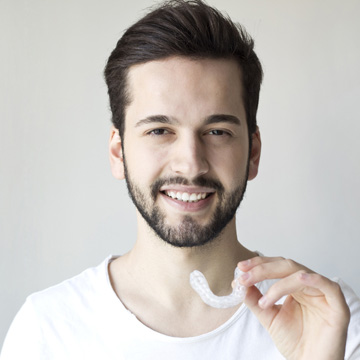
 San Francisco, Marin, and Oakland, CA
San Francisco, Marin, and Oakland, CA
An overbite is when the upper teeth protrude too far over the bottom teeth, and the lower jaw appears recessed. Typically, traditional braces have been the go-to for correcting overbites in teens and adults. But now, an increasing number of people are choosing Invisalign to get straighter teeth. Using several sets of clear, plastic aligners, Invisalign exerts gentle pressure to guide teeth into their preferred alignment. Patients prefer Invisalign because the aligners are transparent and removable, but does this method of treatment correct orthodontic issues such as an overbite? In this article, your Invisalign providers in San Francisco at Glen Park Dental answer this question.
An overbite is more common than you might think
The overbite represents about 70 percent of all dental disorders in children. There are two types of overbite—vertical, which is when the top teeth have significantly overlap the bottom teeth; and horizontal, which occurs when your top teeth jet out in front of bottom teeth. No matter which type of overbite you have, it’s caused by either dental or skeletal issues. Determining the cause dictates the way the overbite will be treated.
What causes an overbite? It may manifest from bad habits, such as thumb sucking or using a pacifier too long. These habits can have more significant consequences during the early developmental stage because this is a key period of time for jaw growth. Overbites also can be hereditary.
What issues can an overbite cause?
Living with an overbite can create difficulties with chewing and eating. It can lead to the development of a speech impediment, such as a lisp. An overbite also can overwork your jaws and jaw muscles, causing pain or even leading to temporomandibular joint disorder. Having an overbite also can lead to the deterioration of your tooth enamel, elevating your risk of cavities as well as gum disease. An overbite often leads to mouth breathing, which is not healthy for the body and results in low oxygenation in the bloodstream.
Invisalign can correct an overbite
When you choose Invisalign, you’re opting for a state-of-the-art treatment system that combines more than a century of past experience and learning in the field of orthodontics with the latest 3D technology and graphics. Invisalign treatment consists of wearing several sets of clear, removable aligners for a set number of weeks. You receive a new set of aligners every few weeks, with each set designed specifically for your teeth and mouth. These aligners exert gentle pressure, moving your teeth incrementally and gradually correcting your overbite. Each patient is unique, but the average length of treatment to correct an overbite through Invisalign lasts about 18 months, although actual length of treatment varies from patient to patient.
Can plastic aligners be used to treat my overbite?
There is no one-size-fits-all answer to this question. However, it is possible to correct an overbite through therapy with clear aligners such as Invisalign. The only way to know the answer for sure is to schedule an appointment with your Invisalign provider in San Francisco. You also need to make sure to choose a practitioner with the requisite skill, knowledge, and experience to evaluate your overbite and determine the best possible course of treatment. At Glen Park Dental, we work with the esteemed Dr. Ariana Ebrahimian, one of the top dentists in San Francisco, Marin, and Oakland. She has studied at the prestigious Las Vegas Institute, the fines institution in North America in the area of post-graduate dental study. She also practices functional orthodontics, which is just one component of our comprehensive program of treatments in the realm of orthodontics.
Even if Invisalign is not right for you, you could benefit from one of our other methods of orthodontic treatment. Take the next step and schedule a consultation at Glen Park Dental today by calling (415) 585-1500 if you’re located in the areas of Marin, Oakland, and San Francisco in California.


